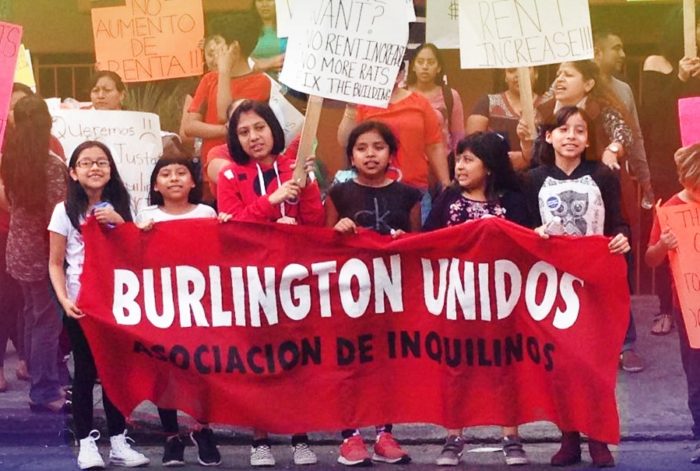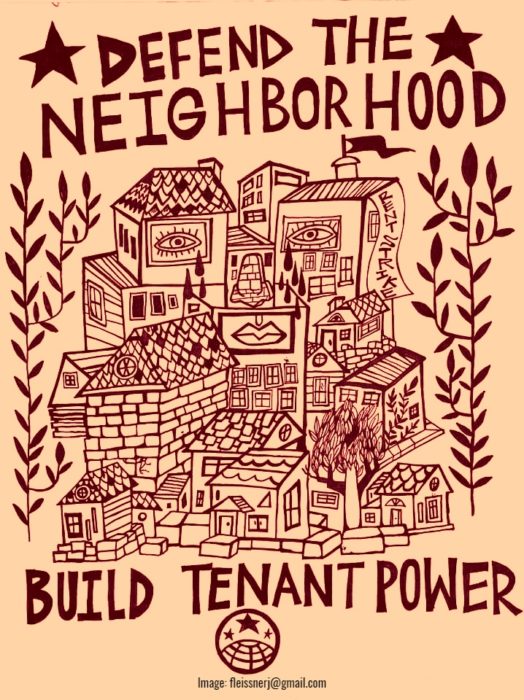
A Statement by Black Rose/Rosa Negra – Los Angeles
Renters across California are facing a crisis: 9.5 million Californians are spending more than 30% of their income on rent with that number has increased by 3.7 million since 2000. The median cost of an apartment in LA or Orange County is 50% of the median income. Between 1985 and 2000, a typical rental would have cost 36% of the median income. Lower income residents spend 121% of their income to afford even the cheapest apartments- meaning that many of us are forced into difficult situations; cramming as many friends or family members as possible into tiny spaces, living in run-down and unmaintained housing, commuting to work for hours each day, or staying in abusive relationships because there’s nowhere else to stay. Or, of course, if we can’t afford to pay the landlord, there’s always the very real chance of joining the 130,000 homeless people in California.
The solution to this crisis is a new economic system organized around needs instead of profit. We need to win the generations-long fight for land and freedom. But getting there will take a long struggle of building a revolutionary renters movement through smaller confrontations with landlords where we can extract concessions and win reforms.
Proposition 10 is one of these confrontations over reforms that can move us one step closer to livable conditions for renters and building a fighting tenants movement. That’s why we encourage people to vote on Tuesday for Prop 10 and to get involved in organizing the tenants movement.
What Will Prop 10 Do?
In 1995, the real estate industry pushed through a law in California called the Costa-Hawkins Act. This law severely limits rent control in our state. Costa-Hawkins prohibits cities from passing new rent control laws that cover housing built after 1995, when the law was passed. It keeps cities with existing rent control laws from expanding them to cover housing built after that city’s rent control law was first passed. It also limits the ways that rent control laws can keep down rent increases. This means that in Los Angeles, where rent control was passed in October 1978, the city can only apply rent control to apartments that were built before October 1978.
Proposition 10 would repeal the Costa-Hawkins Act. This would allow tenants to push their local governments to expand rent control and create new rent control laws. Proposition 10 will expand the tenants movement’s ability to pursue legal strategies to end rent hikes. Attempts to repeal Costa-Hawkins through the state legislature last year were blocked by Democratic politicians close to the real estate industry. In response, tenant organizations and non-profits went directly to Californians, and used their signatures to place the repeal on the 2018 ballot as a proposition.
The most important aspect of this campaign is that it stems from organizations like the LA Tenants’ Union which build popular power to directly confront landlords and speculators. In the past year the union’s members organized an unprecedented number of high-profile campaigns against rent-hikes and evictions, using direct action tactics like pickets and rent-strikes. While various non-profits like the AIDS Healthcare Foundation have provided funding and support for Prop 10, a victory on rent control could be claimed as a clear product of the power of tenants themselves.
For us, this is a key point. Fights to change policy, like Prop 10 or the recent rent freeze for unincorporated areas of LA County, are always secondary to base building. Direct action organizing block-by-block is the foundation of a tenants movement and policy changes can be a useful means to improve conditions and advance movements with a strong autonomous base. The recent wave of rent strikes and the autonomous communities that built them are what makes this measure deserve our support.

What won’t Prop 10 do?
Proposition 10 alone will not fundamentally change the conditions of our lives. It will not lower rents or stop gentrification. It merely removes one of the legal barriers that is preventing the movement from achieving these goals. If Prop 10 passes, it will be up to tenants in every city in California to fight the landlords and create new limits on rent increases and evictions. A policy victory is only a precursor to block by block organizing on the ground.
Even winning expanded rent controls will fail to make a substantial impact without a movement to enforce them and hold landlords accountable. We can’t rely on the state to hold abusive landlords accountable. Furthermore, rent control still leaves landlords with many incentives to harass and evict their tenants. While many of the recent high-profile campaigns of the LA Tenants’ Union have been in buildings not subject to rent control, they have plenty of members who are fighting to hold on in rent-controlled apartments. If landlords can force their current tenants out, they can hike up the rent and advertise to wealthier renters, remodel the property into luxury condos, or even tear down the whole building and replace it with higher cost apartments. Seen in this context, winning expanded rent control will merely add another tool to our arsenal in the fight for a fair housing system.
In the future, we will need to push the tenants struggle forward by stepping up from defensive demands that slow down exploitation, such as limiting rent increases and stopping evictions, to offensive demands that genuinely improve our lives. Part of the reason why the US leads the world in poor housing conditions is because the state abandoned public housing as it embraced neoliberal economics in the 1970s. We must take the offensive to win new public housing in California and fix the housing crisis. As well, we must aim beyond public housing measures of the past and instead develop a model of social housing that is democratically run and managed by tenants instead of through government bureaucracies. We support targeting wealthy low-density neighborhoods like Hancock Park and San Marino in LA for new social housing, because these are places near urban centers where the land is not being efficiently used and could be redeveloped into democratic and ecological neighborhoods, run by those who live in them.
Make no mistake, that fight extends far beyond merely bringing down high rents or even creating examples of new social housing. Rent itself is exploitative, and landlords are parasites who we would be better off without. A system where money is concentrated in the hands of a few people who can buy up properties to sell for a profit without doing any work themselves, while the rest of us pay through the nose everyday so we’re not thrown out on the streets, is not a fair or free system. We cannot have adequate housing for everyone as long as housing is privately owned and a profit-making commodity. Changing that is going to take massive confrontational and revolutionary movements of working people – movements where people can organize themselves and realize their power to challenge landlords and the system that sustains them.

Why are Anarchists Supporting an Election Campaign?
As anarchists, we’re obviously not interested in campaigning for political candidates. As a national organization, Black Rose/Rosa Negra has been critical of the renewed focus by many left groups in the US to revive left electoral strategies,“inside-outside” or otherwise, that views electoral victories as a complement or means to movement building. But our position is not based on a moral stance around engagement with the state – rather we see left electoralism as an ineffective strategy that actively undermines movement building. Trying to get politicians elected means participating in running the state and taking part in the management of capitalism – the state’s ultimate purpose. If we are going to create a revolutionary movement, it must be independent of the capitalist class and the institutional forces aligned with the state such as political parties. You can’t run the police department that protects the property of the landlords at the same time as trying to redistribute housing to workers – you have to choose a side. Throughout history, movements have foundered when faced with this contradiction. Believing politicians will save us requires either a deep commitment to reformism or forgetting our past mistakes.
A ballot proposition is different from electing a politician. We are not trying to participate in the state. We are forcing ahange in the law. Despite our complete lack of respect for the law, it shapes our world. Changing the law is one of the many ways that we can exercise our power to change the world we live in. This is something anarchists have been doing for generations – from the campaign for an eight hour day, to the votes on abortion legalization in Ireland and Argentina this year.
One argument against voting in any election is that it legitimizes the state. That may be true to some extent, but many other tactics that we use also legitimize the state, from suing the police for violating our civil rights, to public sector workers organizing to get better working conditions from the state, to putting pressure on the state to use environmental regulations to block pipelines and mines. The state will continue to function whether or not working class and oppressed people grant it legitimacy. It relies on the capitalist class and on its own repressive force much more than on whether we as individuals acknowledge its power and authority.
Popular Power For Land and Freedom
In our analysis, winning the fight for Proposition 10 will strengthen and empower the burgeoning tenants’ movements. For us, that makes it worth a vote. We encourage everyone to talk to your neighbors about Prop 10 and about your greedy landlords and unsafe and undignified housing conditions. Whether Prop 10 succeeds or fails, make rent control a reality by organizing to press your demands. Only then can we channel our collective power towards a revolutionary fight for land and freedom, “tierra y libertad.“
For an overview on tenant and community organizing in Los Angeles we recommend the brief interview, “Tenant Power from Below: The Los Angeles Tenants Union” and the YouTube presentation “A Year In Popular Power #2 – Stopping ICE Raids with the Koreatown Popular Assembly.” We also highly recommend “Resources on Tenant Organizing, Housing and Gentrification.“
